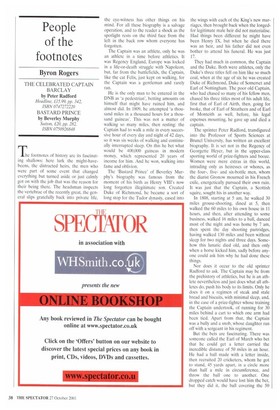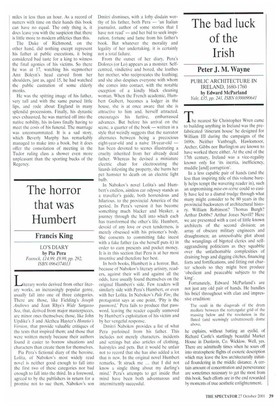People of the footnotes
Byron Rogers
THE CELEBRATED CAPTAIN BARCLAY by Peter Radford Headline, £15.99, pp. 342, ISBN 0747272220 BASTARD PRINCE by Beverley Murphy Sutton, £20, pp. 282, ISBN 0750926848 he footnotes of history are its fascinating shallows: here lurk the might-havebeens, the distracted heirs, the men who were part of some event that changed everything but turned aside or just calmly got on with the job that was the reason for their being there. The headsman inspects the vertebrae of the recently great, the general slips gratefully back into private life,
the eye-witness has other things on his mind. For all these biography is a salvage operation, and to the reader a shock as the spotlight rests on the third face from the left in the back row whom everyone has forgotten.
The Captain was an athlete, only he was an athlete in a time before athletics. It was Regency England, Europe was locked in a life-or-death struggle with Napoleon, but, far from the battlefields, the Captain, like the cat Felix, just kept on walking, for the Captain was a gentleman and rarely ran.
He is the only man to be entered in the DNB as 'a pedestrian', betting amounts on himself that might have ruined him, and almost did. In 1809, he attempted 'a thousand miles in a thousand hours for a thousand guineas'. This was not a matter of walking so many miles, then resting: the Captain had to walk a mile in every successive hour of every day and night of 42 days, so it was six weeks of walking and continually interrupted sleep. On this he bet what would be 400,000 guineas in modern money, which represented 20 years of income for him. And he won, walking into fame and oblivion.
The 'Bastard Prince' of Beverley Murphy's biography was famous from the moment of his birth as Henry VIII's now long forgotten illegitimate son. Created Duke of Richmond, he became a sort of long stop for the Tudor dynasty, eased into the wings with each of the King's new marriages, then brought back when the longedfor legitimate male heir did not materialise. Had things been different he might have been Henry IX, but when he died there was an heir, and his father did not even bother to attend his funeral. He was just 17.
They had much in common, the Captain and the Duke. Both were athletes, only the Duke's three titles fell on him like so much coal, when at the age of six he was created Duke of Richmond, Duke of Somerset and Earl of Nottingham. The poor old Captain, who had chased so many of his fellow men, chased his three titles most of his adult life, first that of Earl of Airth, then, going for broke, that of Earl of Strathern and of Earl of Monteith as well, before, his legal expenses mounting, he gave up and died a captain.
The sprinter Peter Radford, transfigured into the Professor of Sports Sciences at Brunel University, has written an excellent biography. It is set not in the Regency of Georgette Heyer, but in the upper-class sporting world of prize-fighters and booze. Women were mere extras in this world, intruding only as heiresses or whores, as the four-, fiveand six-bottle men, whom the diarist Gronow mourned in his French exile, energetically pursued their own ruin. It was just that the Captain, a Scottish squire, sought his in another way.
In 1808, starting at 5 am, he walked 30 miles grouse-shooting, dined at 5, then walked the 60 miles to his own house in 11 hours, and then, after attending to some business, walked 16 miles to a ball, danced most of the night and was home by 7 am, then spent the day shooting partridges, having walked 130 miles and been without sleep for two nights and three days. Somehow this lunatic died old, and then only when a horse kicked him, sadly before anyone could ask him why he had done these things.
Nor does it occur to the old sprinter Radford to ask. The Captain may be from the prehistory of athletics, but he is an athlete nevertheless and just does what all athletes do, push his body to its limits. Only he does it on a regimen of steak and stale bread and biscuits, with minimal sleep, and, in the case of a prize-fighter whose training the Captain undertook, of running for 30 miles behind a cart to which one arm had been tied. Apart from that, the Captain was a bully and a snob, whose daughter ran off with a sergeant in his regiment.
But the bets are fascinating. There was someone called the Earl of March who bet that he could get a letter carried the incredible distance of 50 miles in an hour. He had a ball made with a letter inside, then recruited 20 cricketers, whom he got to stand, 45 yards apart, in a circle more than half a mile in circumference, and throw the ball one to another. One dropped catch would have lost him the bet, but they did it, the ball covering the 50 miles in less than an hour. As a record of nutters with time on their hands this book can have no equal. The only thing is, it does leave you with the suspicion that there is little more to modern athletics than this.
The Duke of Richmond, on the other hand, did nothing except represent his father at public executions, it being considered bad taste for a king to witness the final agonies of his victims. So there he was at 17, watching his stepmother Ann Boleyn's head carved from her shoulders, just as, aged 15, he had watched the public castration of some elderly monks.
He was the spitting image of his father, very tall and with the same pursed little lips, and rode about England in many splendid processions. Finally, his dynastic uses exhausted, he was married off into the native nobility, his in-laws finally having to meet the costs of his funeral. The marriage was unconsummated. It is a sad story, which Beverly Murphy has remarkably managed to make into a book, but it does offer the consolation of meeting in the Tudor ruling class a shower even more unpleasant than the sporting bucks of the Regency.











































































 Previous page
Previous page